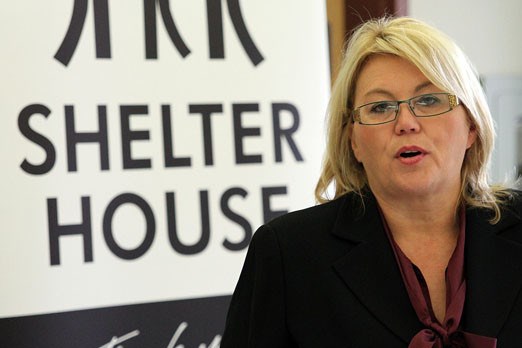City Hall is coming to the rescue of chronic alcoholics who have no place to call home.
City council on Monday agreed to kick in a one-time $270,400 capital grant to allow Shelter House to complete renovations on a 15-bed provisional housing project for chronic alcoholics in the city’s homeless population. On Tuesday the project got another boost, a $116,830 contribution from the Thunder Bay Housing and Homelessness Coalition.
“This is absolutely monumental what just happened,” Shelter House director Cal Rankin said after council unanimously agreed to the funding. “These are citizens in our community who have been denied housing for various reasons because there haven’t been housing models to serve their needs.”
Based on Toronto’s Seaton House, the project will stabilize clients at a building on the corner of George and Simpson streets, offering them small doses of wine daily by trained support workers. A nurse practitioner will also regularly be on site.
“They’ll be limited. They’ll be monitored. Over a period of time their drinking will subside to a certain degree and they become much more manageable over the long term,” Rankin said.
According to police statistics, Intoxicated people account for more half of arrests made in the city. And 50 specific people account for 80 per cent of the more than 3,000 public intoxication arrests in Thunder Bay every year. Police estimate this costs more than $1 million in wages alone annually, with another $350,000 in direct wages to paramedics.
“We’re looking for those who require our program the most. We ant the weakest, the sickest, that’s who we want to serve. The people who need the service the most,” Rankin said. “We know who they are. They have been clients of our for many years and have been homeless for many years.”
Liisa Leskowski, the chairwoman of the Housing and Homelessness Coalition, said their portion of the funding will go toward the capital renovations to the project, and helps the organization meet its community plan and recognizes the number of homeless individuals or those at risk of becoming homeless because of their addictions.
"We really felt that the Shelter House project would really address those issues in our community," she said.
The problem isn't going away, said Leskowski, who also happens to be the executive director of the John Howard Society, an organization that tries to reintegrate prisoners into the community.
"Where the rubber meets the road is where individuals live on the street. And as an agency that delivers those services, we have first-hand knowledge of the need for this in our community. This will help all of us as service providers in addressing some of the issues we face when we try to help house indivduals or keep them out of jail specifically because they have an addictions issue," Leskowski said.
"It shouldn't be something that should be criminalized, nor should it means that someone doens't have their basic living needs met."
Coun. Andrew Foulds said along with cost savings to emergency personnel, it will free up those workers to provide services to other people in the community. And from a humanitarian point of view, the people who will use the provisional housing are currently homeless and drinking things like hairspray and hand sanitizer. The project can help them get back on track.
“This is not humane in my opinion,” Foulds said of what’s being done currently to help. “Perhaps most importantly it will provide these citizens with some dignity.”
Coun. Mark Bentz said while it’s a great program, the city is constantly being asked to provide services and funding that should be provided by senior levels of government. He wants to make sure Shelter House and the city are doing what they can to get the province and federal government on board with programs like the two-year pilot project Shelter House is doing.
“More and more dollars are going to healthcare and really the municipal level is not intended for that function,” Bentz said.
City manager Tim Commisso said the city officials have spoken directly with the health ministry and other provincial department s several times, but have never been given a commitment. He’s hoping now the provincial elction is over the city can get a firmer answer.
“We’ve asked three times at the provincial level for support,” Commisso said. “To date we have not been successful.”
Rankin said Shelter House is receiving grants from senior levels of government with applications for more, but agrees they should already be at the table.
“At this point we’re going to prove to them that this is a good thing,” he said.
Construction should be completed by the end of November with the program running by January 2012. The city will be receiving annual updates.
-- With files from Leith Dunick
